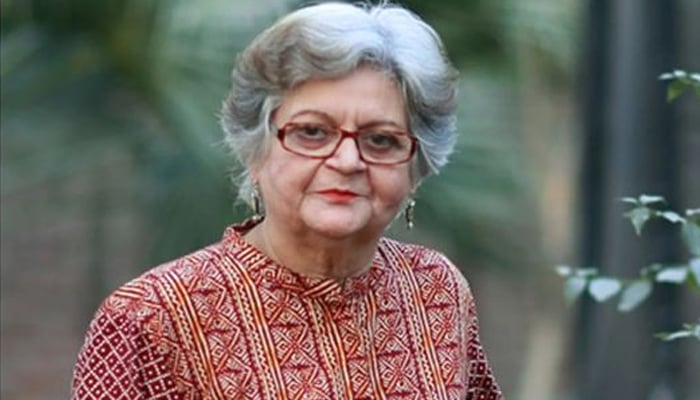Three women honoured with Sughra Rababi awards
The Rababi Fine Arts, in collaboration with the Pakistan Medical Association, held an exhibition and prize distribution ceremony for an art competition of students on the theme of Palestine at the Arts Council of Pakistan, Karachi, on Saturday.
Three women were honoured with awards in recognition of their outstanding achievements in the realms of arts, humanitarian services, and human rights.
Painter, art educationist, writer and curator Salima Hashmi was given Sughra Rababi Lifetime Achievement Award in Arts, ex-HRCP chairperson Zohra Yusuf received Sughra Rababi Human Rights Award and Sadiqa Salahuddin, director of the Indus Resource Centre, was honoured with Sughra Rababi Humanitarian Award.
In her opening speech, Dr Zeba Vanek, daughter of Sughra Rababi, “Sughra Rababi was an artist whose goal was to create beauty in the world through her expressive creations, and sje raised voice for and supported the oppressed, whether they were in Palestine, Pakistan or Somalia.”
She said her mother’s career that spanned more than five decades was largely dedicated to raising funds for Palestinian students, Somalian famine victims and Bosnian war victims. In recognition of her artistic and humanitarian contributions, UNICEF created a Sughra Rababi Fund, she said, adding that the Mayor of San Francisco also declared 19th January 1994, as ‘Sughra Rababi Day’ in San Francisco, where she had held a charitable exhibition.
Born in 1929, Vanek said, Sughra Rababi was a graduate of the Saranagati School of Art, Karachi and alumna of Rabindranath Tagore’s Shantiniketan Fine Arts University, West Bengal. She also displayed some of Sughra Rababi’s paintings on projector.
Prof Shehnaz Ismail, founding member of the Indus Valley School, gave a detailed introduction of Salima Hashmi, recipient of the Sughra Rababi Lifetime Achievement Award in Arts and later presented her the award.
Salima Hashmi said, “Sughra Rababi rose above her own travails to speak of the suffering of Palestinians, and as we know suffering continues so long after she left us.”
“We are living in a moment of history in which we are not only witnessing wrenching pain, but we also seem to be incapable of facing it as species,” she added.
Veteran journalist Gazi Salahuddin introduced and presented the human rights award to Zohra Yousuf. He said Yousuf was basically a journalist. “In the early 80s, she served as the editor of Star Weekend. Her editorial skills were exceptional, and during her tenure as an editor, she nurtured talented writers. Her deep connection with the HRCP extends to both her work and her personality,” he added.
She was also a founding member of the Women Action Forum, which became a big movement in the country. She has served as the chairperson of HRCP, joining the ranks of only two other women who have held this position: Asma Jahangir and Hina Jilani. “Working in the field of human rights is a challenging task nowdays, especially in a country like ours where the situation of human rights is worsening by each day. The understanding, commitment, and courage required for this job are all present in Zohra Yousuf.”
Zohra Yousuf said, “In my opinion, this honour is undeserved in some ways. I was surprised by the nomination, as I tend to work in the background and am not a high-profile person.”
She mentioned that IR Rehman and Asma Jahangir encouraged and inspired her.
Initially, she was hesitant to take on the role of HRCP chairperson, but Asma pushed her to accept the position and throughout her tenure both IR Rehman and Asma Jahangir stood by her.
“The human rights situation in this country presents a continuous challenge.
When an incident occurs, we often find ourselves getting upset and worked up, struggling to respond in a suitable manner. People often criticize us for not following up on cases, but addressing an incident fully becomes difficult, especially when a more alarming and disturbing case follows. This is a non-stop, constant challenge for the human rights movement in Pakistan.”
Journalist Zubaida Mustafa shed light on Sadiqa Salahuddin’s humanitarian work towards women and girl’s education and nutrition, child protection, community involvement. She said there were two principles of welfare work: First, to genuinely empathise by understanding and sharing in the pain of the people you serve, all while maintaining a sense of self-esteem. We should go two steps ahead of sympathy, that is called empathy. The second principle involves empowering individuals to stand on their own, a goal that Sadiqa’s IRC is actively pursuing. She said Sadiqa embodies both these principles.
Sadiqa Salahudin said that she was not the sole contributor to all the work; rather, every individual working in her institution played a crucial role. She said that this award is a recognition for everyone associated with it for a long time, who have dedicated themselves tirelessly, working day and night.
Later, prizes were distributed among the winners of the Sughra Rababi Art Competition.
-
 AI Superintelligence Race: Meta And Microsoft Back Rival Visions—Who Will Win?
AI Superintelligence Race: Meta And Microsoft Back Rival Visions—Who Will Win? -
 Chatbots Push Users Into ‘delusional Spirals,’ Experts Warn
Chatbots Push Users Into ‘delusional Spirals,’ Experts Warn -
 Economist Slams AI Doom Predictions, ‘replacing Humans Is Not Innovation’
Economist Slams AI Doom Predictions, ‘replacing Humans Is Not Innovation’ -
 KATSEYE's Manon Bannerman Takes Break From Group For Personal Reasons
KATSEYE's Manon Bannerman Takes Break From Group For Personal Reasons -
 Prince Harry's Reaction On 'disgraced' Uncle Andrew Arrest Revealed
Prince Harry's Reaction On 'disgraced' Uncle Andrew Arrest Revealed -
 Eric Dane’s Friends Initiate GoFundMe To 'support' His Two Daughters After His Death At 53
Eric Dane’s Friends Initiate GoFundMe To 'support' His Two Daughters After His Death At 53 -
 Internet Erupts After Candace Owens Claims Elon Musk And Sam Altman Are ‘not Human’
Internet Erupts After Candace Owens Claims Elon Musk And Sam Altman Are ‘not Human’ -
 Will Princess Beatrice, Eugenie Stay In Contact With Andrew? Source Speaks Out
Will Princess Beatrice, Eugenie Stay In Contact With Andrew? Source Speaks Out -
 ‘AI Revolution Is Coming Fast & US Has No Clue,’ Bernie Sanders Warns Of Speed Of Disruption
‘AI Revolution Is Coming Fast & US Has No Clue,’ Bernie Sanders Warns Of Speed Of Disruption -
 Hong Kong Touts Stability,unique Trade Advantages As Trump’s Global Tariff Sparks Market Volatility
Hong Kong Touts Stability,unique Trade Advantages As Trump’s Global Tariff Sparks Market Volatility -
 ‘Miracle On Ice’ Redux? US Men Chase First Olympic Hockey Gold In 46 Years Against Canada
‘Miracle On Ice’ Redux? US Men Chase First Olympic Hockey Gold In 46 Years Against Canada -
 Friedrich Merz Heads To China For High Stakes Talks In An Effort To Reset Strained Trade Relations
Friedrich Merz Heads To China For High Stakes Talks In An Effort To Reset Strained Trade Relations -
 Astronauts Face Life Threatening Risk On Boeing Starliner, NASA Says
Astronauts Face Life Threatening Risk On Boeing Starliner, NASA Says -
 Hailey Bieber Reveals How Having Ovarian Cysts Is 'never Fun'
Hailey Bieber Reveals How Having Ovarian Cysts Is 'never Fun' -
 Kayla Nicole Looks Back On Travis Kelce Split, Calls It ‘right Person, Wrong Time’
Kayla Nicole Looks Back On Travis Kelce Split, Calls It ‘right Person, Wrong Time’ -
 Prince William And Kate Middleton Extend Support Message After Curling Team Reaches Olympic Gold Final
Prince William And Kate Middleton Extend Support Message After Curling Team Reaches Olympic Gold Final




